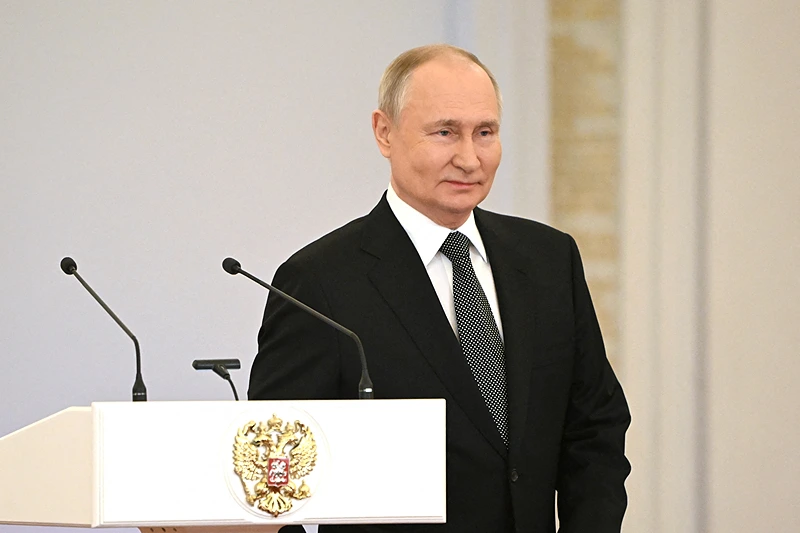
OAN’s Brooke Mallory
11:23 AM – Friday, December 8, 2023
Vladimir Putin has declared that he will seek the presidency once more in the March 2024 elections in Russia, a decision that may see him hold onto power until at least 2030.
Following a ceremony at the Kremlin, the Russian president’s official home, Putin made the announcement on Friday.
In an attempt to maintain his hold on power as prime minister or head of state for more than 20 years, Putin, 71, will run for president a fifth time in the elections scheduled for March 17th.
Residents in the seized Ukrainian regions of Donetsk, Luhansk, Zaporizhzhia, and Kherson—annexed by Russia during the conflict—will also be voting in their first presidential election since the 2018 elections.
The Central Election Commission of Russia said that on March 15th, 16th, and 17th, over the course of three days, “house-to-house voting” will be held in those four regions. The local elections in these areas, which were arranged by officials with Russian support, have already been denounced by the international community as fraudulent.
August 1999 saw Putin take over as Russia’s acting prime minister, and on New Year’s Eve of that year, then-President Boris Yeltsin abruptly handed over the presidential baton to Putin.
Before leaving office in 2008, Putin held the office for two four-year terms. This was due to the fact that he was not allowed by the constitution to seek another term as president. Putin supported Dmitry Medvedev, who succeeded him as president, and he became prime minister once more.
However, Putin won back the presidency in 2012, and he has not let go of it since. Putin first signed a bill in 2021 that allowed him to seek two more six-year terms after winning re-election in 2018.
Due to the legal modifications, Putin may be able to continue ruling until 2036, when he will be well into his third decade of power and in his mid-80s.
In March, Putin should only see minimal resistance. Opposition politicians have suffered similar outcomes during his autocratic rule: exile, incarceration, or even death under dubious circumstances.
On allegations of extremism, Russian opposition leader Alexei Navalny, who presented one of Putin’s biggest political obstacles while he was in office, was given a 19-year jail term in August. According to Navalny and his allies, his detention was politically motivated and meant to stifle his criticism of Putin.
When Navalny returned to Russia in 2021, he was taken into custody right away. 2020 saw him transported from Russia to Germany following his poisoning with the nerve toxin Novichok, which was used during the Soviet period.
After being sent to a hospital in Berlin for medical attention from the Siberian city of Omsk, Navalny was found unconscious. However, Russia still disputes any responsibility for Navalny’s poisoning. In December 2020, Putin declared that Russian security services “would have finished” the assassination of Navalny if they had wanted to.
The Kremlin makes a great effort to shield the Russian people from the worst of the ongoing Ukraine-Russia conflict. However, Ukraine has made several attempts to bring the battle closer to home by conducting its own strikes on Russian towns, including the Kremlin.
The exact number of Russian casualties from the conflict in Ukraine is still unknown. Defense Minister Sergei Shoigu declared in September 2022 that 5,937 soldiers had lost their lives in the conflict. Since then, however, the ministry has not released a report that has been disclosed to the American press.
U.S. intelligence placed the death toll even higher.
The defense ministry of the United Kingdom stated in October that since February 2022, Russia has most likely experienced between 150,000 and 190,000 “permanent causalities,” which refers to dead or permanently injured soldiers or civilians.
As the Russia-Ukraine war approaches its 22nd month, Russia continued to draw on its population earlier this month when it declared it would increase its military force by 170,000.
Stay informed! Receive breaking news blasts directly to your inbox for free. Subscribe here. https://www.oann.com/alerts

